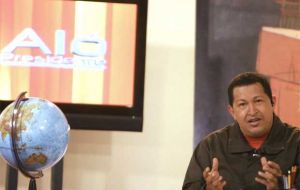MercoPress. South Atlantic News Agency
Opposition grabs Caracas and 5 states in Venezuelan polls
 Chavez: “No one can say there is a dictatorship here.”
Chavez: “No one can say there is a dictatorship here.” Venezuela's opposition cut deep into President Hugo Chávez's majority and standing during last Sunday's local elections when it won five of the country's most populous states as well as the crucial mayor's office of the capital Caracas.
But Chavez United Socialist Party of Venezuela took the remaining 17 governorships, largely in the country's less populated rural areas and for a fractious opposition coalition the president remains Venezuela's main political figure undisputable for the fractious opposition. Before the election the opposition held two governorships. Now this includes the oil-rich western states of Zulia, Miranda, and Carabobo, plus Nueva Esparta and Tachira. Opposition candidates did well in urban areas, sweeping aside some of Chávez's most trusted lieutenants. In the populous state of Miranda, former vice-president and close Chávez adviser Diosdado Cabello was defeated by Henrique Capriles, while former Interior and Justice Minister Jesse Chacon lost his bid to be mayor of the Sucre division of Caracas, home to some of the capital city's worst slums "With these results, the people have reaffirmed our road to socialism," Chávez told cheering red-clad supporters after the national election board released preliminary results in the early morning. "No one can say there is a dictatorship here." "What is important is that the map of Venezuela is starting to change," said Manuel Rosales, the opposition leader who ran against Chávez in the 2006 Presidential elections and whom the President has repeatedly threatened to jail for alleged corruption. The President, who campaigned almost daily for his supporters, had earlier predicted his party would sweep the gubernatorial races and had threatened to put tanks in the streets in case the opposition won. "In this election, there was something for everyone," said Robert Bottome, an analyst with Caracas-based Veneconomia. "The opposition showed that they could gain ground by doing well in the cities. Chávez, after nine years of office, did well in holding down his losses." Opposition winners were quick to pledge to work with Chávez to help solve the country's problems. New Caracas Mayor Antonio Ledezma said he called Chávez after winning the vote, promising to work hand in hand with the Venezuelan leader to improve life in the country's capital. "The government knows we haven't come to fight," said Capriles. Still, Chávez may decide to sidestep opposition governors and mayors. In July the President decreed a law, giving himself the right to appoint regional leaders who could supersede elected officials. If he follows through, the chances for greater conflict could grow What are Chavez next steps is hard to anticipate but he is facing a difficult 2009, particularly in the face of falling oil prices. Revenue from oil makes up more than 90% of the country's exports and provides the government with 50% of its money. Analysts have estimated that Chávez needs oil at a price of at least 80 US dollars a barrel to cover current expenditures. Fears of a worsening economic picture have sent the black market rate of the country's currency soaring, while braking corporate investment and hammering the price of the country's bonds. Analysts predict that Chávez, who has served as President since 1999, will either have to cut expenditures or devalue the currency to make ends meet next year. Both steps could erode "El Commandante's" popularity. Cuts in social spending could alienate the country's poor, who are Chávez's main supporters. But a devaluation would lead to higher prices and spur inflation, especially as the country imports about 70% of its food. The country's inflation rate was 36% for the 12-month period ended in September, the highest in the region. "With Chávez, economic decisions are taken on a short-term, ad hoc, and pragmatic basis," says Julia Buxton, a political science professor at Britain's University of Bradford who follows Venezuelan politics. "The worry is that the economic situation is going to get worse."




Top Comments
Disclaimer & comment rulesCommenting for this story is now closed.
If you have a Facebook account, become a fan and comment on our Facebook Page!